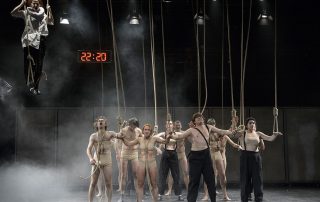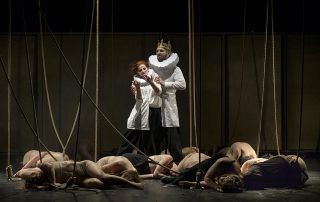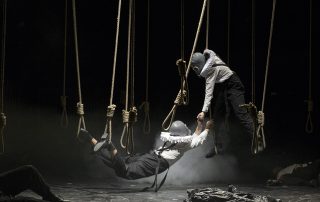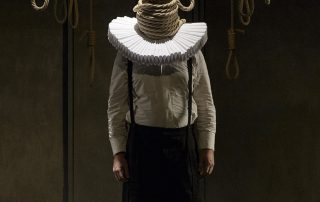SHAKESPEARE, SONNET 66
The “Gergely Csiky” Hungarian State Theatre, Romania
Directed by: Kokan Mladenović
Choreography: Andreja Kulešević
Music composer: Irena Popović
Dramaturge: Kornélia Góli
Scenic designer: Marija Kalabić
Costume designer: Tatjana Radišić
Director Assistant: Zsófia Szerda
Stage Manager: Irén Deák
Lights: Zoltán Gidó
Sound: Adrian Berindei
Poster: Levente Benedek
Photo: Márton Bíró
Cast: Géza Aszalos, Attila Balázs, András Zsolt Bandi, Emília B. Borbély, Zsolt Csata, Enikő Éder, Anna Horváth, Attila Kiss, Levente Kocsárdi, Rita Lőrincz, Etelka Magyari, Imre Zsolt Mátyás, Bence Molnár, Csaba András Molnos, Emese Simó, Mónika Tar, Andrea Tokai
Duration: 80 minutes
Tired with all these, for restful death I cry,
As, to behold desert a beggar born,
And needy nothing trimm’d in jollity,
And purest faith unhappily forsworn,
And guilded honour shamefully misplaced,
And maiden virtue rudely strumpeted,
And right perfection wrongfully disgraced,
And strength by limping sway disabled,
And art made tongue-tied by authority,
And folly, doctor-like, controlling skill,
And simple truth miscall’d simplicity,
And captive good attending captain ill:
Tired with all these, from these would I be gone,
Save that, to die, I leave my love alone.
——————————–
Timişoara is a multicultural town. It is a well-known fact. And because our audience is very diverse, we at the Csiky Gergely Hungarian Theatre cover their preferences through a rich repertoire, sensitive to the taste of the public for the classic or contemporary authors. Therefore, we offer different types of performances: classic and contemporary theatre, non-verbal performances, music, puppets and marionette theatre plays.
What is important to be mentioned here is: our public benefits from a simultaneous translation into Romanian by means of earphones (or subtitles) in order to facilitate the access, but also to show that the language is not an impediment but a binder.
The company of the “Gergely Csiky” Hungarian State Theatre of Timişoara is young, enthusiastic, with awards for their level of professionalism, always in search of new forms of artistic expression. This is why we mean to diversify our offer, but also to participate in the bold projects with the potential to offer cultural opening.
Among the main projects of the theatre is TESZT, the Euroregional Festival of Theatre Timişoara now at its 10th edition. The event is international and is meant to promote the knowledge of multiculturalism and inform the public about the latest dramaturgical events in the DKMT Euroregion and wider. Over the years, the Festival has turned into a platform for cultural exchange and also into an invitation to a dialogue with artists and theatre people.
Every year, TESZT enriches its proposals with movie projections, book launchings, debates, scenography exhibitions and workshops. Moreover, the Theatre opens its doors and brings out the joy of the performance and music into the street, close to the public, so that, in the end, everybody may experience and feel the celebration of the theatre.
———————————
Two years after the premiere of the successful production of The Beggar’s Opera, Kokan Mladenović has created a new play with the ensemble of the “Gergely Csiky” Hungarian State Theatre in Timişoara, Romania – “Shakespeare, Sonnet 66”. The text of Shakespeare’s Sonnet 66 was written 400 years ago, and is here reread through the lens of the events and social problems of 2017.
Shakespeare is not famous only for his dramatic texts. Social critique is present in his lyrical works as well in a more concise form, and is expressed in a concrete language. The play “Shakespeare, Sonnet 66” preserves the universe of Shakespearean motifs and characters, but at the same time approaches today’s major themes using each of the sonnet’s verses as a starting point. You will get to see, once again, Othello, Macbeth, Richard III, Romeo and Juliet, Titus Andronicus, and other characters who have their counterparts in the world of today.
The universality of Shakespearean messages has been delivered in this play based on movement and gesture, while the only spoken text is Sonnet 66.










